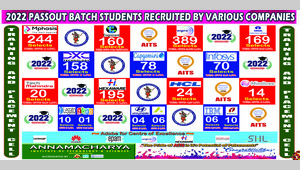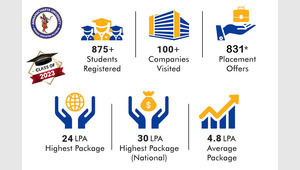Department
Artificial Intelligence & Machine Learning
Publications
Student publications at universities play a significant role in both academic and personal development. Here are some key aspects of their importance:
- Skill Development
- Writing and Editing: Students improve their writing, editing, and proofreading skills, which are valuable in any career.
- Research and Analysis: For academic journals, students learn to conduct research, analyze data, and present findings clearly.
- Design and Layout: Publications often involve designing layouts and working with digital tools, which can enhance technical skills.
- Academic and Professional Growth
- Portfolio Building: Published work can be included in a student’s portfolio, showcasing their skills to future employers or graduate programs.
- Networking Opportunities: Students often connect with professionals, faculty, and peers through publication work, which can lead to mentorships and job opportunities.
- Recognition: Being published can enhance a student’s resume and academic profile, contributing to recognition in their field of study.
- Contribution to University Community
- Knowledge Sharing: Student publications disseminate knowledge, ideas, and research, enriching the academic environment and fostering intellectual exchange.
- Community Engagement: Publications can address campus issues, celebrate achievements, and create a sense of community among students and faculty.
- Creative Expression
- Literary and Artistic Outlets: For those involved in literary magazines or arts publications, these platforms provide an avenue for creative expression and exploration.
- Personal Voice: Students can share their perspectives and experiences, contributing to a diverse range of viewpoints and narratives on campus.
- Leadership and Collaboration
- Teamwork: Working on publications often involves collaboration, teaching students how to work effectively in teams and manage group projects.
- Leadership Skills: Students may take on leadership roles, such as editor or manager, which can help develop organizational and leadership skills.
- Civic and Social Impact
- Awareness: Publications can raise awareness about important social issues, promote causes, and drive campus and community discussions.
- Advocacy: They offer a platform for advocacy and activism, allowing students to voice their opinions and drive change on relevant issues.
- Historical Record
- Documentation: Student publications serve as a record of campus life, events, and achievements, providing historical documentation for future students and researchers.
In essence, student publications are a vital part of university life, offering numerous benefits that extend beyond the classroom and contribute significantly to students’ overall development and the university community.
Students can get involved in university publications in a variety of ways. Here are some common avenues:
- University Newspapers: Many universities have student-run newspapers where students can write articles, edit content, or take on other roles like layout design or photography.
- Academic Journals: Some universities have undergraduate or graduate research journals where students can submit their research papers, essays, or other scholarly work.
- Literary Magazines: These publications often feature creative writing, poetry, and artwork by students. They’re a great place for students interested in literature and the arts.
- Online Platforms and Blogs: Universities may have online platforms or blogs that allow students to publish articles on a variety of topics, from current events to personal experiences.
- Newsletters: Some departments or student organizations produce newsletters that highlight events, achievements, and news related to their area of focus.
- Student Associations or Societies: Many student groups have their own publications, including magazines, journals, or newsletters that showcase their activities and member contributions.
- Annual Reports and Yearbooks: These often feature student contributions, from written pieces to photographs and design work.
Getting involved in any of these publications can be a great way to develop writing and editing skills, build a portfolio, and contribute to the university community.





